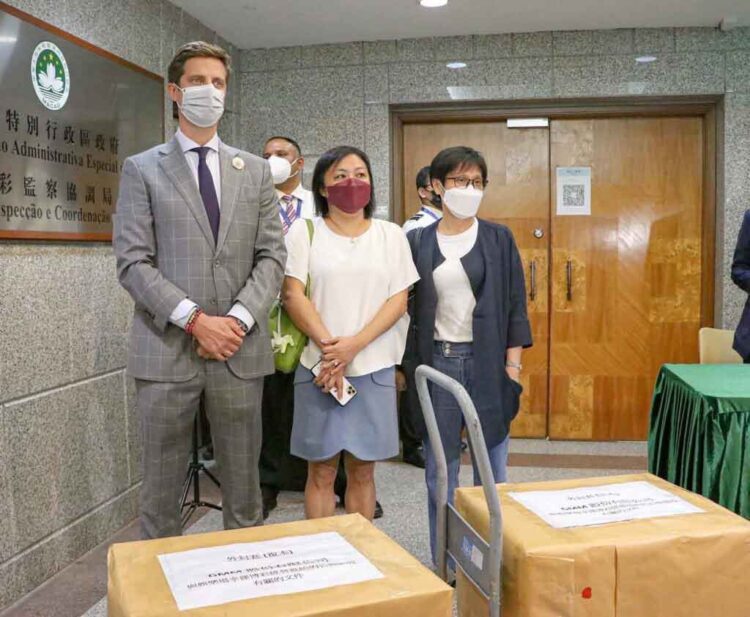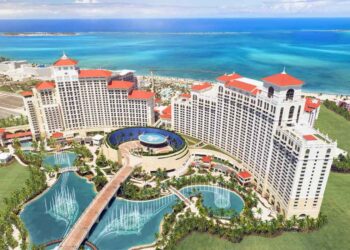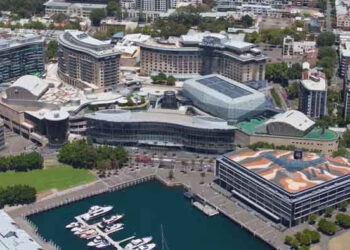Many IAG readers have asked for an in-depth analysis of Genting’s chances of being successful in their bid for a Macau casino concession and the implications for Macau of a Genting win. In this two-part article, to be published today and tomorrow, IAG conducts an in-depth examination of Genting’s bid.
At one minute to midnight — well ok, actually 14 minutes before the 5pm deadline on 14 September, but that doesn’t sound nearly as dramatic — an unexpected seventh bidder for a Macau casino concession emerged, upsetting the applecart for the incumbent sextet oligopoly. The site of the drama was the office of Macau’s gaming regulator, the Gaming Inspection and Coordination Bureau, known by its Portuguese acronym, the DICJ. The Big Six incumbents had lodged their bids at the DICJ office earlier that day, except for Wynn Macau which lodged the day before.
On the day of the lodging deadline – and the official opening of the tender documents two days later – the DICJ offices saw a veritable cavalcade of familiar faces, all snapped by the press, representing a cross-section of the most famous figures in the Macau casino gaming industry. There was Galaxy Deputy Chairman Francis Lui (with no less than President of the Macau Lawyers Association, Neto Valente, accompanying him), the trio of Ho siblings – Lawrence, Pansy and Daisy representing Melco, MGM and SJM respectively, along with SJM Resorts Managing Director Angela Leong and Secretary-General Rui Cunha, MGM President (Strategic) and CFO Kenny Feng and General Counsel Antonio Menano, Melco’s COO for Macau David Sisk, Wynn Macau Vice Chairman Linda Chen, Sands General Counsel Dylan Williams, and many more.

But amongst this who’s who of Macau concessionaire senior leaders, like a mysterious stranger kicking up dust while riding into town in a western movie, a most unfamiliar sight – local Macau lawyer Bruno Nunes accompanied by a Mrs Chen and someone who subsequently turned out to be Fong Yee Wai, an employee of Yany Kwan Yan Chi. Kwan is, or at least was, a partner of Genting in the Treasure Island property being constructed opposite Casino Lisboa. The property had been touted as a potential future “Genting Macau,” although with the demise of holding entity Genting Hong Kong and the transfer of equity to Ao Mio Leong, this seems less likely now.
The Nunes, Chen and Fong trio were there to lodge an application for a Macau concession for a company named GMM Limited. The first thing out of the mouths of the assembled journalists was, “Who?”
The savvy immediately suspected Genting – it was the “G” in “GMM” that gave it away – and within minutes IAG’s journalist on the ground was searching the Macau company register and confirmed the suspicion. Presumably the twin Ms in GMM stand for Malaysia and Macau, in an as-yet-undetermined order.

While the Macau media quickly answered the “Who?” question, no-one has delved deeply into the more meaningful questions of “Why?” and “How?” So, let’s do it!
Firstly, “Why?” There’s no need to repeat any of the countless column-inches that have been written about the near-apocalypse the Macau gaming industry has suffered since the outbreak of the pandemic nearly three years ago. Combined concessionaire debt is now estimated at a staggering US$24 billion – up from just US$5 billion in 2019 – and as a cohort the Big Six are losing between US$500 million and US$1 billion a quarter.
It’s understandable that the existing concessionaires, with their infrastructure currently in place and their properties arguably almost worthless if they lose the right to deal cards, are bidding for a continuation of their casino businesses. It’s the only way they have a shot at recouping the obscene losses they have accrued during the pandemic. But why on earth would Genting want to get involved in a such a … er … storm? (Omitting the impolite first syllable, which also begins with “s”.)
It may be unfinished business. Remember that Genting missed out last time around, 20 years ago. Also, Genting is always referred to as “the most global IR company in the world,” but with an obligatory qualifier, “but no Macau.” Both the unfinished business and the obligatory qualifier may well grate with Genting Chairman Tan Sri KT Lim, and he’s decided to do something about that.

But the real reason may be more about commercial aspirations than merely finishing the unfinished or scrapping an unwanted tagline. After the past nearly three years of pain, it’s becoming easy to forget that Macau was once the absolute darling of the IR world. It was Macau in first place, and daylight second. Macau’s 2013 high-water mark GGR of US$45.1 billion for the year is a simply eye-watering number that no other single city market in the world has ever come anywhere near. Compare that to second place Las Vegas (the Strip, Downtown and North Las Vegas combined), which had an all-time record-breaking GGR for the fiscal year to June 2022 of US$9.3 billion. And that’s 2022 dollars, not 2013 dollars.
Most will say “but that was then, and this is now,” rightly pointing to the subsequent annihilation of Macau’s junket industry and mainland China’s now unrelenting and pernickety oversight of capital flows out of the mainland. But the market is still there. One thing remains just as true today as it was back in 2013 – there are over 100 million people in China’s richest province of Guangdong, a great deal of whom love to gamble. And most of them are just a short train, bus or car ride away from Macau – the only place in all of China where casino gaming is legal. If China’s central government ever backs off from its current policies which have been (intentionally or otherwise) hobbling Macau, that enormous addressable market has the potential to return.

Genting is a company with a 57-year history. They have had their ups and downs over the decades. The “ups” have included the cash cow monopoly of Resorts World Genting up a mountain an hour’s drive north of Kuala Lumpur and their surprise victory in Singapore giving them entrée into the city-state’s lucrative duopoly market. The “downs” have included the recent pandemic-induced collapse of Genting Hong Kong, which imploded with some US$2.8 billion of debt, leading to the loss of both Genting’s holding in Resorts World Manila (now Newport World Resorts) and its Hong Kong cruise business, although the latter loss may be somewhat ameliorated by the phoenix-like launch of Resorts World Cruises in Singapore.
Through all this Genting has proven its ability to survive the march of time, and it’s this long-run thinking that may be the inspiration behind Genting’s bid in Macau.
Having examined the “Why?” of Genting’s bid, let’s move on to the “How?” How could Genting actually win their bid, thus wrestling a concession away from one of the incumbent sextet? And if they did, how would it be accretive to Macau as a whole? How would Genting, the losing concessionaire and the Macau government deal with the minefield that is reversion? How would Genting, in a very cash-strapped environment, finance a multibillion-dollar Macau casino gaming business, and its subsequent trading losses? Make no bones about it, they would be losing money from day one. These are all questions we will examine tomorrow.
The second and final part of this article will be published tomorrow before 8am Macau time.






























